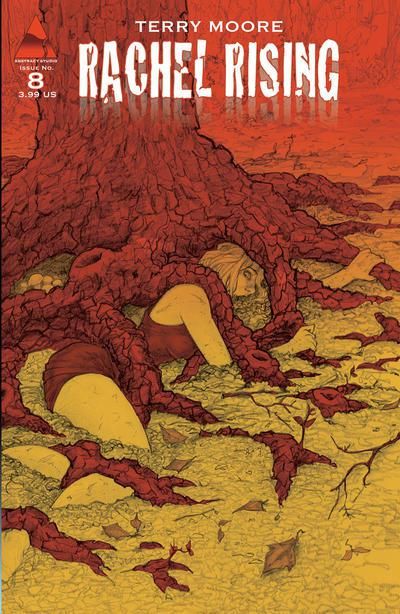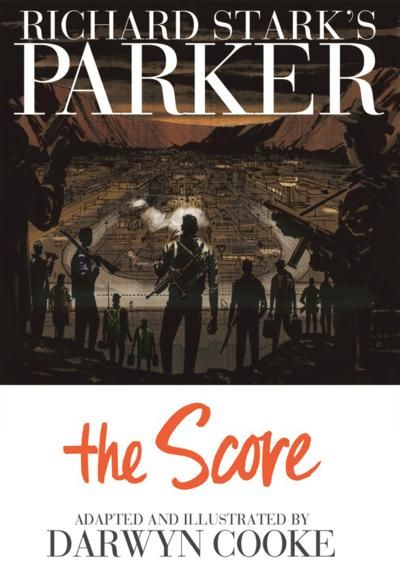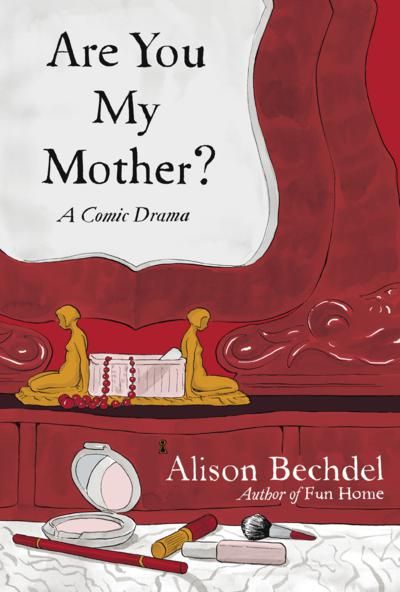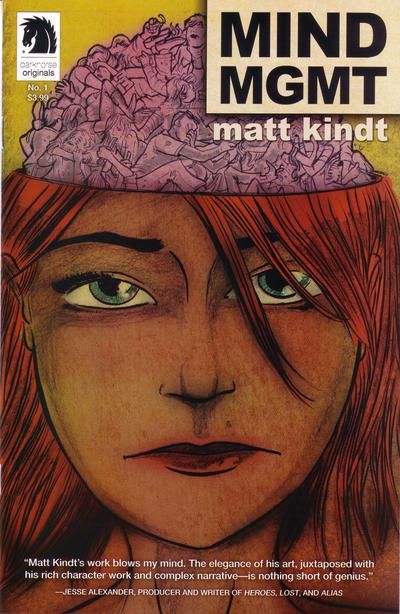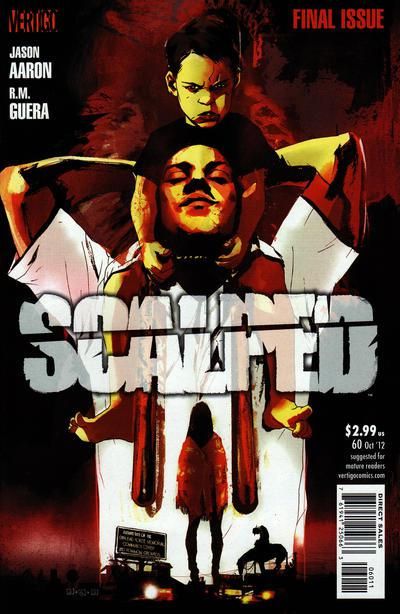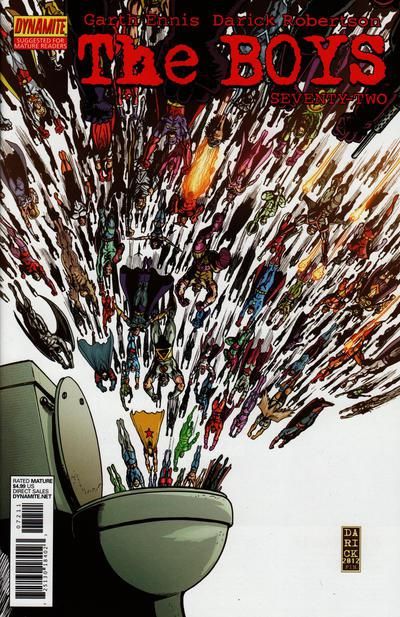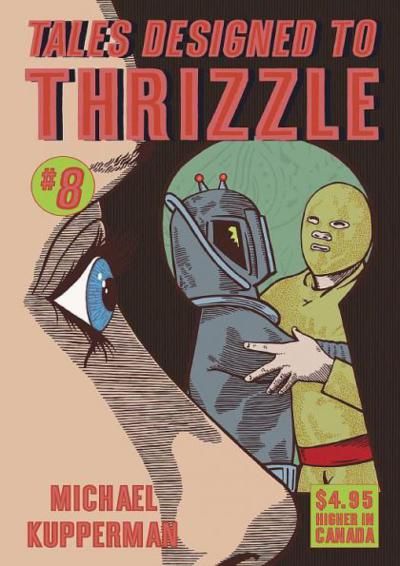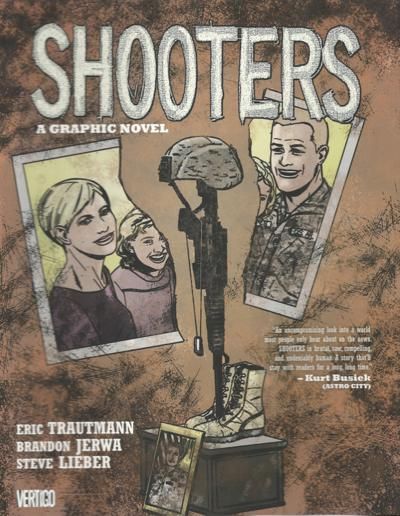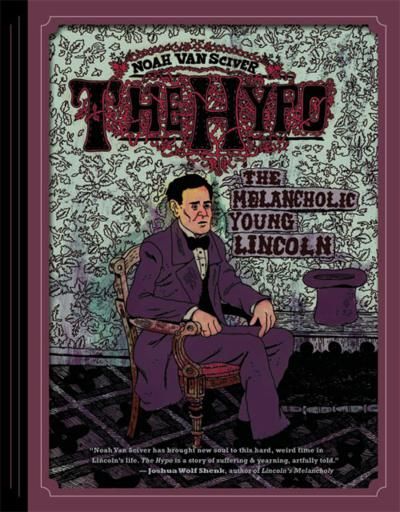As always, it was another difficult year to narrow my favorite comics down to just ten. Unlike years past, though, I won't be having any honorable mentions on this list. Instead of just throwing in "honorable mentions" at the beginning of my list, I will instead be doing separate spotlights over the weekend for the books that I liked a lot this year but fell just shy of my top ten. So here is my top ten (no ties for number ten - that's cheating!)!
10. Terry Moore's Rachel Rising
Much like the best horror writers out there, Moore expertly develops the personalities of his various characters so that when terrible things happen to them, it hurts that much more. Moore's matter-of-fact delivery of horror makes the horror of the situation stand out greater than you expect, as he lulls you in with well-developed normal people who then suddenly have a magic snake attacking them. His art is strong as always. His crisp lines also make the terror feel a little more "real." Plus, you have to love a demon-possessed little girl who kills people like crazy without really knowing what she is doing. The visual is powerful.
9. Darwyn Cooke's Parker: The Score
With his third Parker adaptation, while the book is quite good (it is in my top ten, after all), I think Cooke takes a bit of a step back from the visual genius of his previous Parker book. However, the end result is still a beautiful-looking, extremely well told crime story.
8. Alison Bechdel's Are You My Mother?
This examination of Bechdel's relationship with her mother follows in the footsteps of her famed graphic novel, Fun Home, and Bechdel seems to make a point to not simply redo the structure of Fun Home, this time mixing her study of her mother's life (and her life with her mother) along with Bechdel's history of therapy and the history of the work of psychoanalyst Donald Winnicot. Does the volume suffer from this divided focus? Yes, a bit. It also suffers in comparison with Fun Home, which is a shame, since it is difficult to duplicate such a powerful hook as Fun Home had (in fact, a fascinating part of Are You My Mother? is the way in which Bechdel has to deal with the fact that her biggest hit is a book talking about her father's sexuality and his death). If there never was a Fun Home, I think Are You My Mother? would have been received better by many people, as Bechdel is a wonderfully talented writer and artist, and she still manages to make the divided focus of the book work for the most part, and there are often scenes that are just absolutely brilliant mixed in. In fact, the comparison between Cooke and Bechdel is interesting. Cook's adaptation is likely easier to read, but Bechdel is more ambitious and when it lands, it really lands, which is why I have her edging Cooke out on my list.
7. Matt Kindt's Mind Mgmt
There are more original thoughts dropped in any given issue of Mind Mgmt than you see in most mainstream superhero titles in a year. The series follows a writer as she investigates the Mind Management, the secret organization that has been affecting world events for years with their special agents (who, naturally, have mind powers). To keep themselves a secret, they occasionally do mind wipes, but one particularly public mind wipe has brought the aforementioned Maru on to their tail. One of the agents of Mind Management is helping her, for reasons you have to read to see. Each issue of Mind Mgmt is PACKED with story, including back-ups and easter eggs that fill you in on more information about the mysterious organization's history. This is a fun, action-packed, thought-provoking series.
6. Jason Aaron and R.M. Guera's Scalped
Throughout the entire run of Scalped, Jason Aaron and R.M. Guera's brilliant series following an FBI agent undercover at the reservation where he grew up, the comparison has been made to HBO dramas, in the sense that this series feels like the sort of crime series that you'd see on HBO, like the Sopranos, Boardwalk Empire and the Wire. Never has this comparison been more apt than with the final volume of the series, where the characters we've been following for 60 issues (or ten volumes of the trade paperback) find their various lots in life. There is a cyclical nature to the characters in Scalped that clearly evokes the ending of The Wire. Certain roles will always have to be filled, and you'll be surprised to see which character ends up filling which role. While I definitely enjoyed the ending of the series, though, I think it is fair to say that the final arc (and especially the final issue) felt a tad more rushed than the rest of the series, almost as if the ending crept up on Aaron and things needed to be finished quickly. It is still excellent, just not as excellent as the rest of the series or the series as a whole.
5. Garth Ennis, Darick Robertson and Russ Braun's The Boys
The Boys, meanwhile, similarly came to a conclusion this year, but Ennis and his artists I believe stuck the landing better than Scalped did. First off, Ennis finished the overarching story of the Boys versus the world's superheroes with a final battle that included a stunning twist that I certainly did not see coming but totally fit the entire series (essentially it asks the question, "If you're a total evil scumbag, how hard is it to convince yourself that you did some crazy awful things that you don't remember doing?"). Then, when everything is seemingly settled, Ennis throws a whole second major twist into the series with the gripping final arc, as a surprising menace arises from the ashes of the previous conflict, pitting friend against friend. Braun did a wonderful job going from merely a "fill-in" for Robertson to nearly making the book feel like his own. I await further Ennis/Braun projects with great anticipation. Robertson, of course, did great work when he was around (mostly the covers and the final issue).
4. Michael Kupperman's Tales Designed to Thrizzle
The latest Tales Designed to Thrizzle very well might be the funniest edition of the annual comic yet! Kupperman's outrageously unpredictable sense of humor is on full force in this issue, with a brilliant take on a "train coloring book" (which contains some scenes you'll never unsee - like two trains making love) and a hilarious ad campaign for "pubic hair restoration" that somehow manages to get even crazier than merely the idea of selling "pubic hair restoration." The high point of the book, though, is the dizzying tale of how we landed on the moon. It is insane and yet wonderfully so. Imagine a space mission that involves Quincy, M.E....you know, in case there are any strange murders during the mission. That's just a drop in the bucket of delightful insanity that this tale (which is the longest story in the book) contains. I haven't even mentioned likely my favorite bit in the book, an ad campaign that goes along the bottom of the pages telling the space adventure. It is a salad dressing ad campaign that gets progressively...strange. Just get this book, people!
3. Eric Trautmann, Brandon Jerwa and Steve Lieber's Shooters
Shooters tells the story of a soldier named Terry who lost most of his unit due to a friendly fire incident. In an attempt to cover up the incident, none of his fellow soldiers will receive any medals. Terry is only receiving one because his father was a high-ranking member of the military. The rest of the volume shows Terry dealing with life after the war, as Post-Traumatic Stress Disorder basically ruins any chance he has for a return to his "normal" life, especially as the only goal he can wrap himself around (petitioning to get his fallen comrades honored) is a seemingly lost cause. The PTSD aspect of the book is fascinating, because like depression, how can you possibly understand it unless you actually lived through it? Here, Trautmann and Jerwa shine as they do their damndest to get us to understand something that we can never really understand. Lieber shines in this book as so much of the book turns on the way that characters react to situations and Lieber is one of the best in the business at facial reactions. He conveys so much with such seemingly simple lines (a lot like Terry Moore). Terry eventually becomes a mercenary and goes back to the Middle East to find a much different situation than when he was a soldier. Through interesting circumstances, he finds himself in a position that challenges Terry to his core of who he wants to be. Is he really just a guy with a gun shooting other guys with guns? Is he only a shooter? Or can he get past that?
2. Noah Van Sciver's The Hypo
If there's any justice in the world, Noah Van Sciver's new graphic novel examination of Abraham Lincoln's early days will make him a big name in the independent comic circles. Van Sciver spotlights a fascinating time in Lincoln's life where he barely resembles the man who would one day become one of the most famous presidents in U.S. history. Here, he is a lawyer who has an uneasy engagement with the sister of his law partner. When both fall apart, he falls into a deep depression (which he calls "the hypo") and Van Sciver stunningly (and pain-stakingly, I might add) depicts this time in Lincoln's life. The artwork is strong, as is the research. If you have any interest in Abraham Lincoln at all, you should pick up this remarkable volume.
1. Chris Ware's Building Stories
In many ways, Chris Ware's works are like everyone else in comics is tossing a ball in the air and catching and throwing a ball in the air and catching it while Ware suddenly throws a second ball in the air and suddenly you're doing something entirely different while still familiar to the original act. That's what Building Stories is like. It is, at its heart, a comic book story, but it is a whole other experience. Chris Ware's Building Stories is a collection of Ware's overlapping stories featuring people who all live in the same building (the building itself is a major character in the story). The volume is so large that it literally comes in a storage box containing the 14 different "elements" of the story (read them in whatever order you'd like). With each new work, Ware challenges the very notion of how to make and read comic books, and Building Stories is a great example of both this challenge and his talents as a storyteller. This is both a powerful work as well as one that has a good deal more sentiment than most other Ware stories, so for those of you who worry about reading a new Ware comic after his past work has been too depressing, this is the Ware comic for you (not that there isn't some depressing stuff in this comic, as well, of course - but it is more the very state of the human condition, sometimes that can get depressing).
Check back later tonight and the rest of the weekend for spotlights on the other comics I felt were the best of 2012!


